Spring Crocus Quilt Block
Note: This post may contain affiliate links. That means we may earn a commission at no additional cost to you if you purchase via our links. Not all links are affiliate links. I only recommend products I use and trust. As an Amazon Associate, I earn from qualifying purchases.
In this quilt tutorial, I am going to show you the traditional method of making Half-Square-Triangles.
Before starting this project, I recommend that you press your fabric with spray sizing. It will make it easier to cut small pieces. Take the time to clean your machine, put in a new needle, and fill a few bobbins. When pressing, just hold the iron over a spot for a moment or two. This pattern assumes a perfect 1/4” seam.
The Spring Crocus Quilt Block
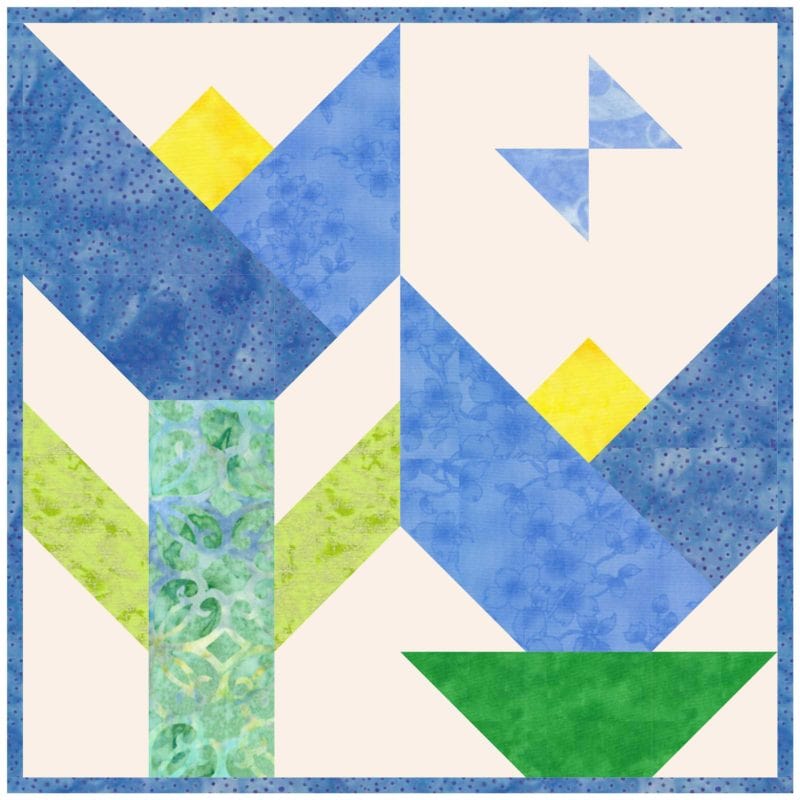
Use the green “Print Friendly” button at the bottom to print these instructions without any distractions.
Cutting instructions
Background
Cut (1) strip 3-1/4″ wide by the WOF. From that strip, cut (1) 3-1/4″ squares and (8) 3″ squares.
Cut (1) strip 2-1/2″ wide by the WOF. From that strip, cut (2) 2-1/2″ squares;
(2) 2″ × 4-1/2″ rectangles and (4) 2″ × 2-1/2″ rectangles.
Lt Green
Cut (2) 3″ squares.
Dk Green
Cut (1) 3″ square and (1) 2-1/2″ square.
Stem Green
Cut (1) 2-1/2″ × 6-1/2″ rectangle.
Blue # 1
Cut (1) 3-1/4″ square; (2) 3″ squares, and (3) 2-1/2″ squares
Blue # 2
Cut (1) 3-1/4″ square; (2) 3″ squares, and (3) 2-1/2″ squares
Blue # 3 (the butterfly)
Cut (2) 2″ squares
Yellow
Cut (1) 3-1/4″ square
How to Make Half-Square Triangles the Traditional Way
To make the Half Square Triangle blocks needed for this block using the traditional method, place a 3″ × 3″ background square and a 3″ × 3″ colored square right sides together. Draw a diagonal line on the back of the one square. Sew 1/4″ on both sides of that line. Cut on the line and press to the dark.

Square up the two blocks you just made to 2-1/2″ × 2-1/2″. You will find a 2-1/2″ square ruler and a mat that rotates very helpful.
Now let’s make some HSTs!
Assemble:
(7) 3″ Background Squares
(2) 3″ Blue # 1 Squares
(2) 3″ Blue # 2 Squares
(2) 3″ Light Green Squares
(1) 3″ Dark Green Squares
Make these HSTs and square them up to 2-1/2″. You will have some leftovers for another project.
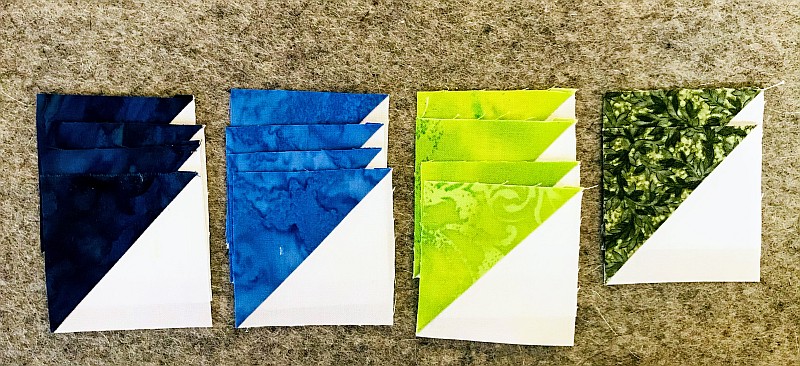
- Make (3) Blue # 1 HSTs
- Make (3) Blue # 2 HSTs
- Make (4) Lt Green HSTs
- Make (2) Dk Green HSTs
How to Make 3-Part HSTs
Kris’ note: There are several different ways to make this block. I chose this method to avoid waste.
Assemble:
(1) 3-1/4″ Background Square
(1) 3-1/4″ Blue # 1 Squares
(1) 3-1/4″ Blue # 2 Square
(1) 3-1/4″ Yellow Square
Cut all the 3-1/4″ squares on both diagonals.
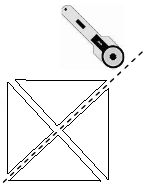
Sew these in groups of (2) as shown below. (You will have some leftovers.) Press the seam open.

- Make (2) from the yellow and background triangles
- Make (1) from the yellow and Blue # 1 triangles
- Make (1) from the yellow and Blue # 2 triangles
- Make (1) from the Blue # 1 and Blue # 2 triangles
- Make (1) from the Blue # 2 and Blue # 1 triangles
Assemble:
(1) 3″ Blue # 1 Square
(1) 3″ Blue # 2 Square
(2) 3″ Background Squares
Cut all these squares on one diagonal.
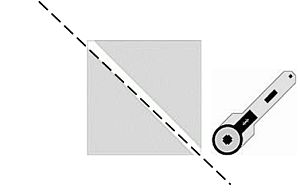
Sew them to the triangle sets you just made as shown below. (You will have some leftovers.) Press the seam open. and square up to 2-1/2″.
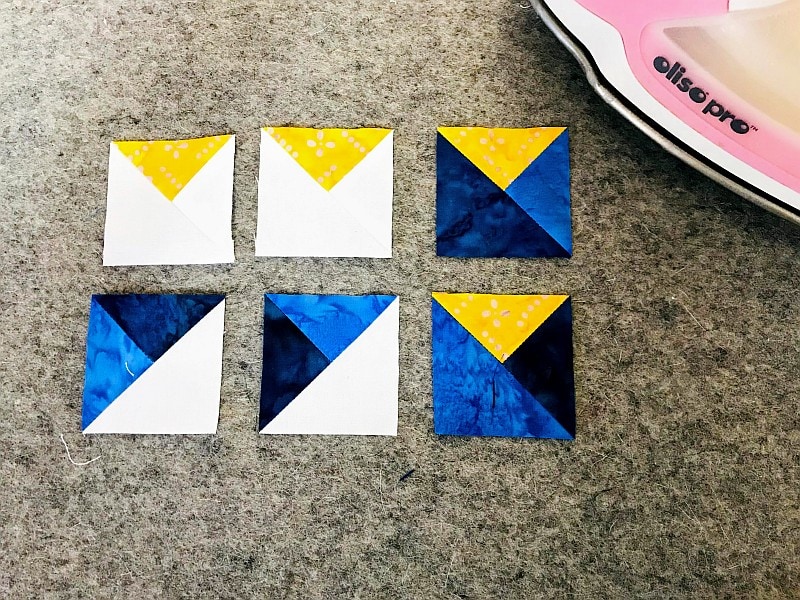
- Make (2) with a background triangle
- Make (1) with a Blue #1 triangle
- Make (1) with a Blue # 2 triangle
- Make (1) with a Background triangle
- Make (1) with a Background triangle
When “squaring up” a block, make sure the diagonal seam is on the diagonal line of the ruler. A set of fussy-cut rulers is a good investment. They have fewer confusing lines, often only showing the diagonals and the 1/4″ seam allowance. Here is where a mat that rotates is worth the cost.
Making the Butterfly
Assemble:
(2) 2″ × 4-1/2″ Background rectangles
(4) 2″ × 2-1/2″ Background rectangles
(2) 2″ Blue # 3 squares
Draw a diagonal line on the back of the (2) Blue # 3 squares. Lay the Blue # 3 square right sides together with one edge of a 2″ × 2-1/2″ Background rectangle so the angle goes from upper left to lower right. This is your sewing line.
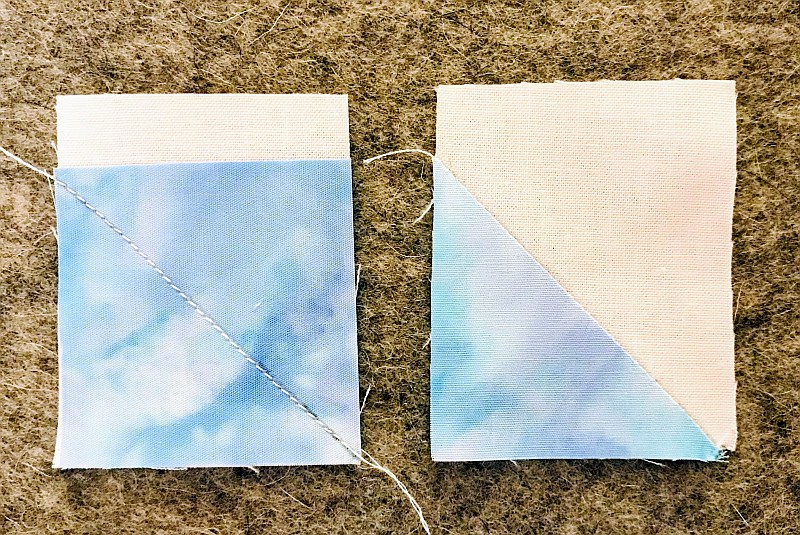
Sew on this line and press the square over itself so the corners meet. If everything is perfect, you can trim the underside to a 1/4″ seam.
Make (2) and sew the end with the square to a 2″ × 2-1/2″ Background rectangle. Rotate these so they make a butterfly and sew between (2) 2″ × 4-1/2″ Background rectangles, pressing as shown.
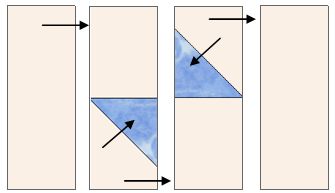
This unit should measure 4-1/2″ × 6-1/2″.

Putting it all together
It took a while to get here, didn’t it? Let’s do inventory.
Assemble:
(12) HST blocks
(6) 3-part HSTs
(1) Butterfly unit
(3) 2-1/2″ Blue # 1 squares
(3) 2-1/2″ Blue # 2 squares
(2) 2-1/2″ Background squares
(1) 2-1/2″ Dark Green square
(1) 2-1/2″ × 6-1/2″ Stem Green rectangle
I am going to switch off to graphics from the pattern so you can see the pressing arrows.
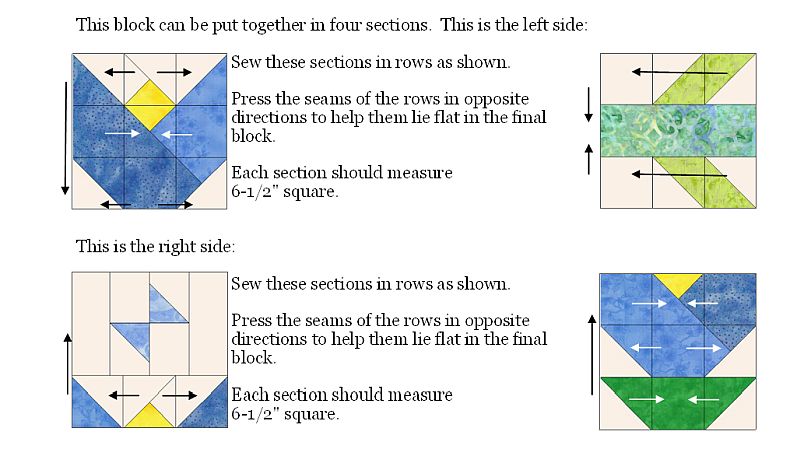
Sew the sides together and press the center seam open. You have a finished block! Square up to 12-1/2″ if necessary.
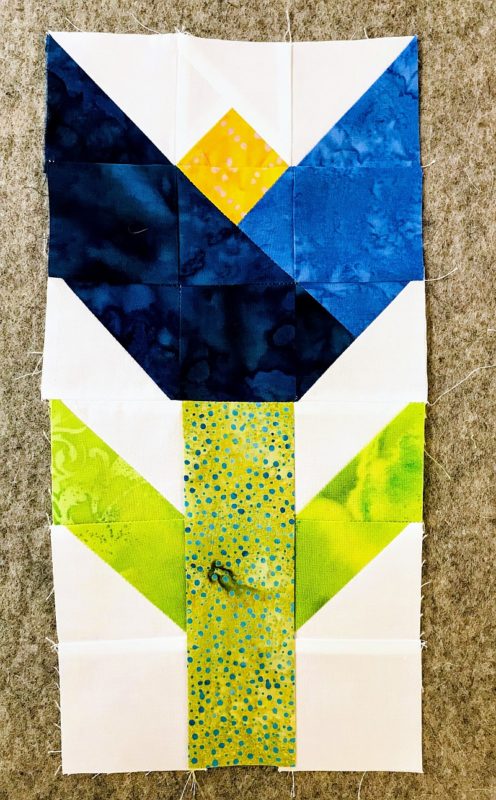
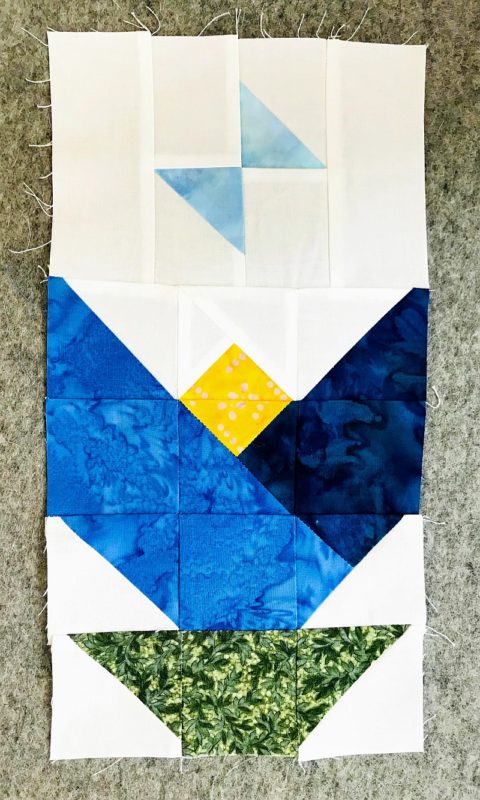
You are done! Whew! I hope next month’s block is a lot easier!
Please add moc.hsadparcs@sirk to your contacts list to make sure you get the confirmation message. Drag the confirmation message from the Promotion tab to the Primary tab if you use Gmail.
If you are already a subscriber, it’s okay to fill out this form. You won’t be put on the mailing list twice.
Don’t forget to sign up for the newsletter! Once a week, I send updates on quilt-related information I have found while wandering the web. This might be an inspiring article, a tip or tutorial I have discovered (or written), and occasionally exclusive offers & discounts as well as immediate access to the secret page of free patterns, guides, and printables. You can follow my page on Facebook, or join the Make Believe Quilters group, too.
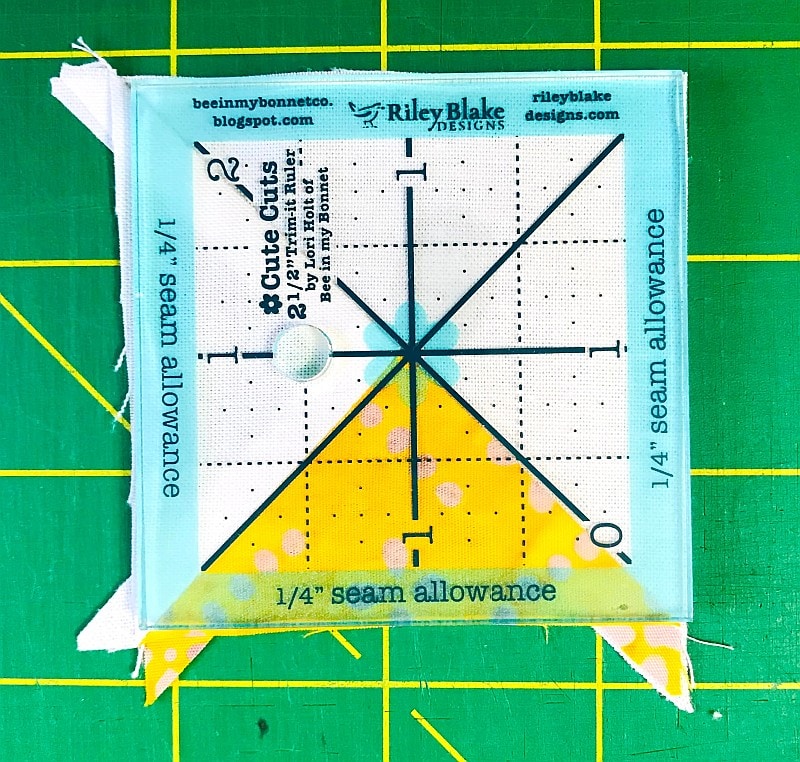
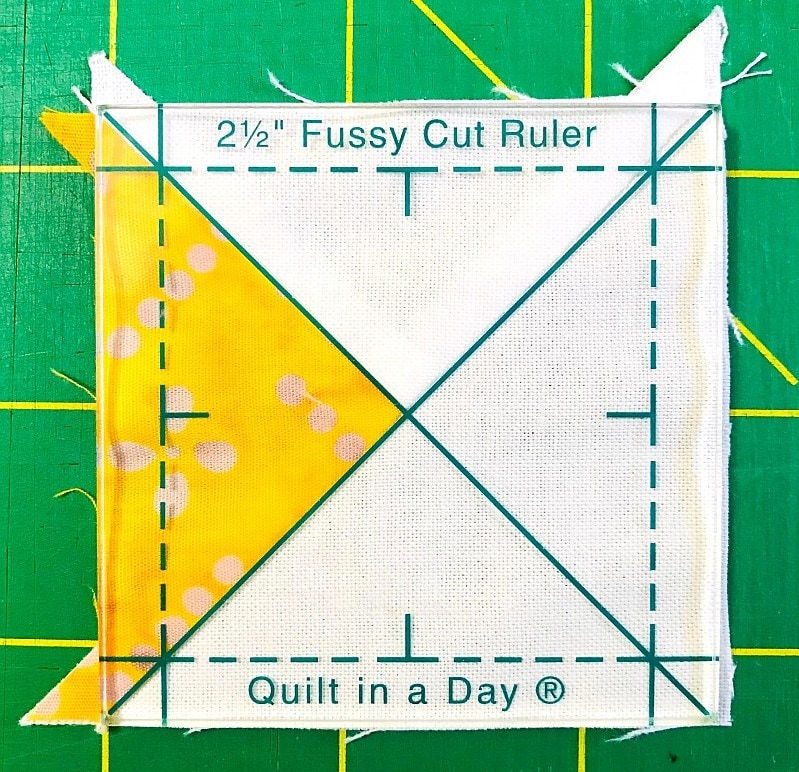

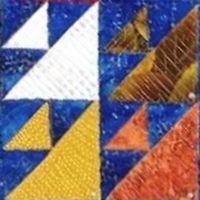
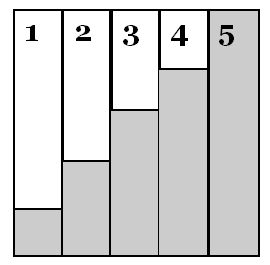
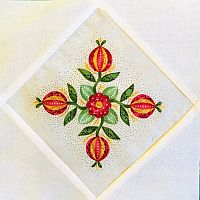
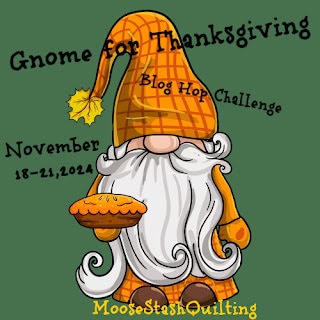
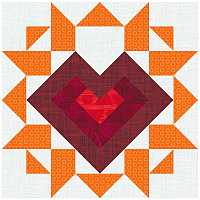
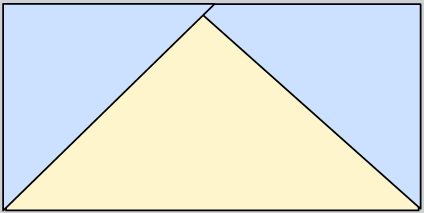
Kris this is just the sweetest block! Crocus is my favourite spring flower. I used to have a “volunteer” that popped up in the middle of the yard every spring. DH knew not to mow it down until it was finished blooming.😉
Thank you! It was fun to make. Although, of course, I had to put a block on backwards and fix it. Oh, well, Jack and I are friends. (Jack the ripper…)